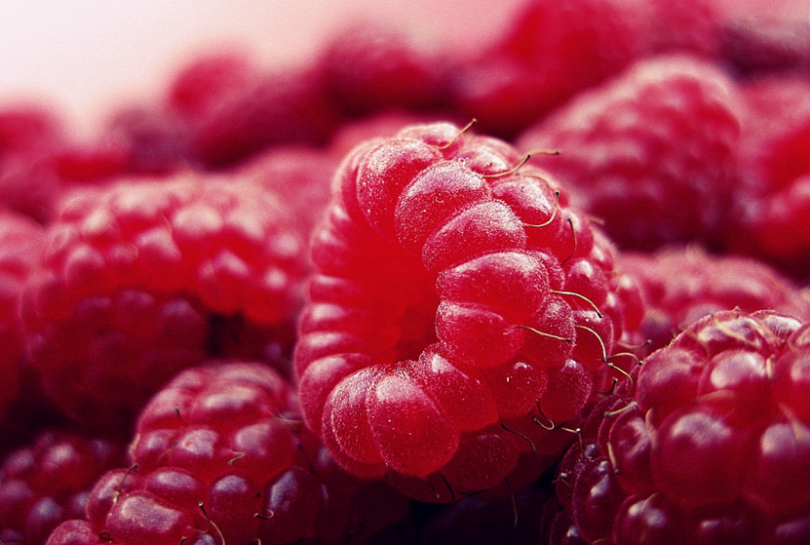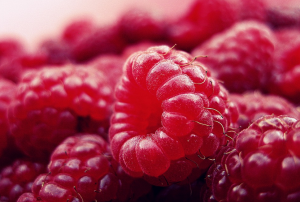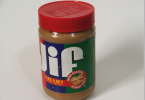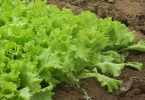Today’s question: can dogs eat raspberries? Are raspberries good or bad for dogs? Scroll down for detailed answers.
We all love a good raspberry! Whether in the summer, or in the winter, a raspberry can be a special treat reminding us of lazy summer days. Raspberries can be enjoyed any number of ways. Either as-is and eaten similar to popcorn, or baked into a pie or bread. Raspberries may be added to smoothies, used as a jam, or even added to water for an extra kick. As much as we find the raspberry useful and enjoyable, we may wonder, can we share with our pups?
Can dogs eat raspberries? The answer is surely a yes! Raspberries contain antioxidants that carry many benefits for dogs. Although raspberries can be somewhat expensive, a way to supplement the cost is to grow your own or to buy from a farmer. With raspberries being grown in a season, the cost for raspberries can be a bit more than other types of fruits. Raspberries have a very pleasant taste that dogs really like and their nutritional values make them a good snack or treat.
Raspberries require a little preparation and only require a wash before being served. Due to the chemical sprays and pesticides used on many farms and supermarkets, the berry is susceptible to releasing a toxin into your body when ingested. Be sure to wash the berry in soap made from fruit, or a natural fruit was you make with essential oils. Once the fruit are cleaned and rinsed, your dog is free to enjoy!
You must remember that your dog can only have small portions of raspberries as too much would cause him harm! Too much of any fruit can be damaging to a dog’s health. While fine in moderation, too much berry will give your dog stomach upset and possibly discourage him/her from eating their actual kibble. In the event you have more questions in regards to raspberries and dogs, or your dog has eaten too much, please call your veterinarian and ask for advice particular to the breed of your dog.
Can Dogs Eat Raspberries – Yes, in Moderation
Dogs can surely enjoy some raspberries from time to time. Occasional raspberry treat would make a great nutritious snack for your furry pal.
Not just dogs, but even wolves have been observed by biologists to forage for different types of berries in the wild. These canines have also been seen enjoying them a lot. Whether the dog enjoys the taste, the victory of the hunt, or the variety to their diet, the dog and its brothers in the species seem to enjoy berries. Although the specific reason why dogs eat them is not clear, it could possibly be the nutritional value or perhaps just the sweet taste. Dogs are naturally drawn to meat as their food source and have evolved to hunt and eat their prey when in the wild. For a dog in the wild to forage for berries is a sign that the dog has evolved to want this taste but also the nutritional value. Dogs do not usually choose a meal or snack based on tastes, and dogs have less of a need for variety than humans. If a preference for hunting berries has developed within the dog species, this is probably due to a nutritional need more than for a taste.
Similarly, pet dogs can eat most berries too, but of course, in moderation. Pet dogs have all they need nutrition wise coming from their dog food. Supplements may be given, and treats of fruit are nice, however, these are not necessary for pet dogs.
Nutrition in Raspberries
Raspberries are an excellent source of vitamin C, which helps to strengthen the immune system. It also helps the body in the absorption of iron. Dogs eat quite a bit of meat as a carnivorous animal, and the protein and iron derived from the meat must be absorbed into their system to be of any value. Raspberries may be able to aid in the absorption of vitamins and minerals, thereby making the meat work even better for the dog on a nutrition scale.
The antioxidants found in raspberries are known to reduce the possibility of acquiring heart disease, cancer, diabetes, and arthritis. Some other valuable nutrients found in raspberries include vitamin B, magnesium, folic acid and copper. All these benefits make raspberries good for your dog!
Calorie Control
If your dog is struggling with a weight problem, raspberries will be helpful in controlling the calorie intake. This is because of the fiber found in this fruit, which will make your dog feel filled up on fewer calories and lesser amounts of food. The berry will give your dog the satisfaction of eating and the pleasure of a sweet treat, while also keeping hunger pains at bay. An added bonus is that the raspberry is of the fruit family and also naturally provides hydration. Keeping a dog hydrated is just as important as keeping yourself hydrated. On a hot day, bringing along raspberries to feed your pup on a walk, or at the park, will be sure to please both you and your pup.
If you put your dog on a diet, the beginning stages can be difficult for him and for you to get through that initial week or two as the dog will feel hungry very often. To help it to deal with the hunger pains you can offer a few raspberries or other low calorie foods that are also rich in fiber. Raspberries may be more appealing because of their treat like size, shape, and color, and may also be used as a topping and placed upon kibble or a bone for the same effects.
Moderation is Essential
Although raspberries offer several benefits to your dog’s health, it is essential that you do not feed him too much of raspberries – or any other food for that matter. A dog does not thrive on excess food. Even excessive dog food or whatever else you feed him can cause discomfort to his stomach and intestines, leading quite surely to diarrhea. For an adult dog, 6 to 10 berries a day should be okay, but only if your dog is a large one. Your vet can better assure you of the amount of berries to feed your dog in one serving. The breed, size, and temperament of dogs vary greatly, and these factors are important in the determination of serving sizes.
The Xylitol in Raspberries
Xylitol is found naturally in raspberries and it is harmful for dogs. However, as the proportion of xylitol found in raspberries is very little, a small quantity of raspberries fed to your dog daily is not likely to cause your pet much harm. You must surely avoid giving your furry pal more than a cup of raspberries a day.
If you have a raspberry bush or tree producing berries, be sure to fence the bush and keep your pup away from the tree. Fallen berries and fallen fruit may be incredibly tempting to your dog. If your dog is unsupervised, s/he may feel free to clean up the fallen fruit and enjoy berries in excess. In the event your dog has eaten too much, do not be too alarmed. The probability of poisoning is low, and the worst reaction will be tummy ache and intestinal issues. As your dog’s body removes the excess berries, you may want to keep the dog outside. While your dog is recovering outside, be sure to check on the dog and make sure the berries pass through his/her system safely. Offer rest and water, maybe some tummy rubs. A quick call to the vet may also be in order, just to get some advice if needed.
Do You Have a Puppy?
If your pet is a puppy, then you need to exercise more caution while feeding him raspberries. Try one and observe how your pet reacts to it. If after a few hours there is no apparent discomfort, then you can probably increase the quantity slowly each day. This is the procedure that you should follow with each new food that you offer to your pup. Remember that puppies or smaller dogs should not be given more than four or five raspberries a day. Consider them a snack, not the main meal for your pet dog.
Healthy Summer Treats
You should avoid giving your dog sugary treats like popsicles or ice cream during the summer. As dogs usually feel the summer heat quite strongly, dog owners are often tempted to treat them with cool snacks that they themselves enjoy. This is likely to cause your dog more harm than ever. Raspberries are preferred as snacks as they are healthy and nutritious. You must understand that your furry friend does not need fruit to remain healthy, because the main nutrition will come from good quality dog foods.
Raspberries Are Rather Expensive
You wouldn’t want furry buddy to become too used to getting raspberries as regular snacks as they are rather expensive. As you are not likely to give your dog sufficient amounts of raspberries to fulfill his hunger, they are likely to act as an additional treat that can be avoided if you cannot afford them all the time.
Conclusion
The truth is that raspberries should not form a regular part of your dog’s diet as dogs mainly require protein rich meals. You should be careful as developing bad eating habits are very easy to develop with a pet that you love. The main proportion of your dog’s meals should be meat, while different fruits can be offered to complement these meals. So the answer to the question that we started with, is surely a yes. Your dog can eat raspberries but not every day and not large amounts
References:
http://www.askavetquestion.com/answer_np.php?id=2669-xylitol-in-fruit-toxic-to-dogs
http://dogcare.dailypuppy.com/raspberries-bad-dogs-3345.html
http://www.dogchannel.com/dog-food/fruits-for-dogs.aspx
http://www.dogster.com/lifestyle/can-dogs-eat-fruit-and-grapes-raisins-dog-health









Leave a Comment